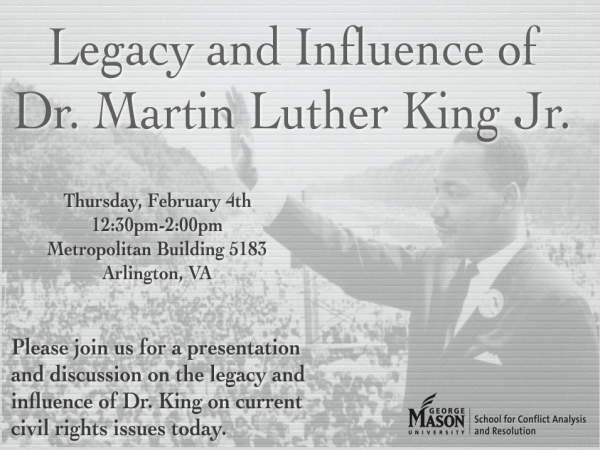Legacy and Influence of Martin Luther King Jr.
Ph.D., Conflict Analysis and Resolution, George Mason University
Ph.D., Philosophy, Washington University, St. Louis, Missouri
M.A., Philosophy, State University of New York at Binghamton
 |
February 4, 2016 12:30pm through 2:00pm
RSVP Here

Johnny Mack and Prof. Daniel Rothbart will present and guide the discussion.
 Johnny J. Mack is Founding President of Communities without Boundaries International. The former chief administrative officer of the Martin Luther King, Jr. Center for Nonviolent Social Change in Atlanta Georgia, Mr. Mack has broad expertise in the fields of peace, conflict analysis and resolution, nonviolence, and comprehensive community planning and development strategies. He has traveled extensively in North America, Africa, the Middle East, Europe and Asia, teaching and lecturing on the topics of nonviolence and peace building strategies. Mack is a doctoral candidate at the School for Conflict Analysis and Resolution, George Mason University.
Johnny J. Mack is Founding President of Communities without Boundaries International. The former chief administrative officer of the Martin Luther King, Jr. Center for Nonviolent Social Change in Atlanta Georgia, Mr. Mack has broad expertise in the fields of peace, conflict analysis and resolution, nonviolence, and comprehensive community planning and development strategies. He has traveled extensively in North America, Africa, the Middle East, Europe and Asia, teaching and lecturing on the topics of nonviolence and peace building strategies. Mack is a doctoral candidate at the School for Conflict Analysis and Resolution, George Mason University.
 Daniel Rothbart is professor of conflict analysis and resolution at the School for Conflict Analysis and Resolution, George Mason University [GMU]. Professor Rothbart specializes in identity-based conflicts, ethics and conflict, civilians in war, and the Darfur region of Sudan. In addition to serving as director of the program on ethics and conflict at his home institution, he currently chairs the Sudan Task Group, an organization that seeks to build long-term peace in this East African country. His academic writings have led to more than forty articles and book chapters in scholarly journals and volumes. His recent publications in conflict analysis and resolution include the following books: Identity, Morality, and Threat: Studies in Violent Conflict (co-edited), Why They Die: Civilian Devastation in Violent Conflict (co-authored), Civilians and Modern War: Armed Conflict and the Ideology of Violence, (co-edited), and Violent Conflict and Peacebuilding: The Continuing Crisis in Darfur, (co-authored). He is currently exploring the power of moral emotions—shame, humiliation, dignity, pride—as central to protracted conflicts or to their resolution.
Daniel Rothbart is professor of conflict analysis and resolution at the School for Conflict Analysis and Resolution, George Mason University [GMU]. Professor Rothbart specializes in identity-based conflicts, ethics and conflict, civilians in war, and the Darfur region of Sudan. In addition to serving as director of the program on ethics and conflict at his home institution, he currently chairs the Sudan Task Group, an organization that seeks to build long-term peace in this East African country. His academic writings have led to more than forty articles and book chapters in scholarly journals and volumes. His recent publications in conflict analysis and resolution include the following books: Identity, Morality, and Threat: Studies in Violent Conflict (co-edited), Why They Die: Civilian Devastation in Violent Conflict (co-authored), Civilians and Modern War: Armed Conflict and the Ideology of Violence, (co-edited), and Violent Conflict and Peacebuilding: The Continuing Crisis in Darfur, (co-authored). He is currently exploring the power of moral emotions—shame, humiliation, dignity, pride—as central to protracted conflicts or to their resolution.




